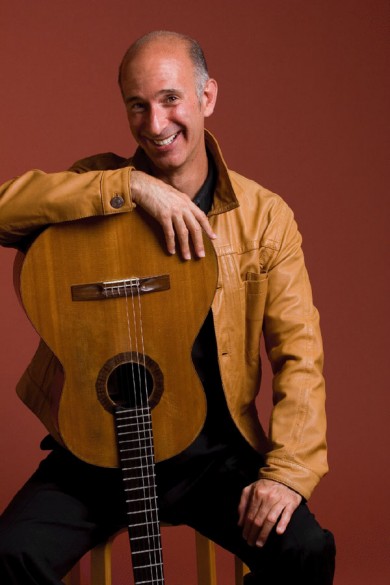Guitarist Leisner at his best in music of Bach, Paganini and himself

Guitarist David Leisner performed a wide-ranging recital Thursday night at Coral Gables Congregational Church.
David Leisner offered a highly diverse guitar recital on Thursday night for the Coral Gables Congregational Church summer concert series. A well-traveled concert and recording artist and teacher at the Manhattan School of Music, Leisner was most effective in music of understated and reflective character.
Leisner seemed not fully warmed up for the opening three Schubert lieder in transcriptions by Hungarian guitarist-composer Johann Kaspar Mertz. Despite some delicate shadings, the familiar Standchen (Serenade) suffered from fuzzy articulation and a choppy melodic line. Liebesbotschaft lacked focus, alternately folksy and overtly agitated. Die Post (from Winterreise) was more consistent, the rhythm crisp and strongly accented.
Leisner’s own five movement suite Labyrinths (2007) signaled an ingenuous and arresting compositional voice. The opening Shimmer stems from a four-note arpeggiated chord, repeated with small changes to hypnotic effect. Shadow is a playful scherzo, alternating the high and low ranges of the instrument. Spooky Halloween sounds dominate Shiver. A chromatic subject is transformed into dissonant, extreme outbursts in Shatter. The interplay of loud and soft dynamics is emphatically accentuated throughout the movement. Shelter is a modernist lullaby, an introspective pattern in repetitive sequence with a touch of intruding blues. Leisner deftly transmitted his arresting creation, reveling in its coloristic and textural complexities. Labyrinths is a fine addition to the classical guitar repertoire.
Paganini’s Grand Sonata in A Major, originally conceived for guitar and violin, was presented as a solo work, the guitar encompassing both instrumental lines. Leisner proved remarkably effective in this flamboyant showpiece. He shaped the instrumental bel canto of the first two movements with stylish grace and summoned speed, fervor and charm for the crucial Andantino and variations.
Bach’s Lute Suite in A minor brought Leisner’s most potent performance of the evening. Bach’s refined introspection fits Leisner’s consummate musicianship like a glove. The quiet beauty of the prelude was followed by a wonderfully transparent fugue. Intricate detailing and clarity of line marked the gravely eloquent Sarabande. The spell that Leisner wove so beautifully was unfortunately disturbed three times by ringing cell phones. Springy, dance-like vivacity brought the Gigue and Double to a sparkling conclusion. During the numerous repeats throughout the suite, Leisner offered inventive, tastefully conceived ornamentation that never impeded the musical flow or called attention to itself.
Leisner’s capable performances of Howard Heitmeyer’s arrangements of songs by Gershwin, Fats Waller and Michel Legrand lacked the stylistic affinity of a top-notch studio guitarist. Antonio Carlos Jobim’s Felicidade wanted greater fire and spontaneity. Heitor Villa-Lobos’ Etude No.7, offered as an encore, had that extra Latin sizzle that the Jobim piece lacked. Leisner, who has recorded the complete guitar music of Villa-Lobos, played with superb energy and bracing precision.
The Coral Gables Congregational Church Summer Concert Series continues on July 21 with jazz trombonist Glen David Andrews. 305-448-7421, communityartsprogram.org.
Posted in Performances
Leave a Comment
Fri Jul 8, 2011
at 12:56 pm
No Comments




